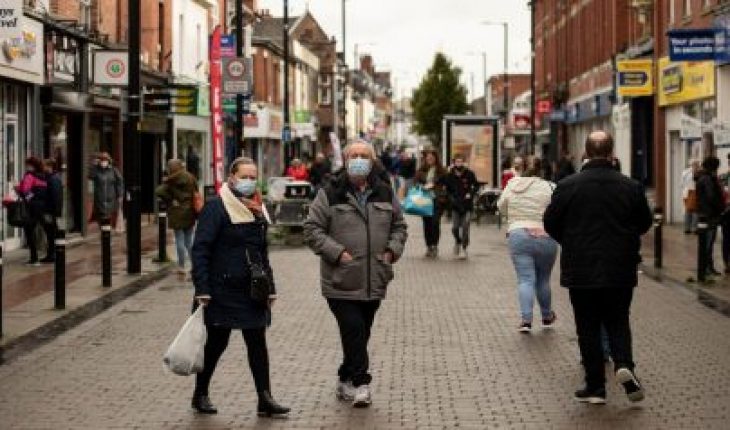With the introduction of curfew in new regions of France and Italy, general re-financing in Wales and increased restrictions in other areas of the UK and Spain, Europe is locking up a little more to try to stem the violent second wave of the COVID-19 pandemic.
According to the European Centre for Disease Prevention and Control (ECDC), the evolution of the pandemic raises “serious concern” in 23 countries out of 27 in the European Union (EU) as well as in the United Kingdom.
Only Finland, Cyprus, Estonia and Greece are saved. A month ago, only seven European countries were on this red list.
Read: Government warns of travel abroad, recommends avoiding them at risk of COVID
The World Health Organization (WHO) warned on Friday that the northern hemisphere is at a critical time in the face of the COVID-19 pandemic, with too many countries recording exponential growth in coronavirus cases.
“Too many countries are experiencing an exponential increase in COVID-19 cases and this is leading to hospitals and intensive care units being close to or exceeding their capacity limits and it is only October,” said WHO Director-General Tedros Adhanom Ghebreyesus at a press conference.
Over the past 24 hours, nearly half of the world’s cases were in Europe, WHO pandemic management manager Maria Van Kerkhove said.
In Europe, the number of cases exceeds 8.2 million and more than 258,000 people have died of COVID-19.
Spain sees tough times
The situation continues to be aggravated also in Spain, the first EU country and the sixth in the world to surpass one million contagions.
On Sunday, spanish government president Pedro Sánchez announced the general alarm across the country and proposed that it be extended until May.
Find out: Spain: measures are urgently needed in senior residences before COVID-19
The alarm status includes a curfew from 23:00 to 6:00, although autonomous governments can advance or delay the limitation by an hour. Confinement, on this occasion, will not be obligatory, he said.
“The situation we are living in is extreme,” Sanchez said at a press conference and reported that the meetings will be limited to six people.
Days earlier, authorities in several of the country’s 17 autonomous regions announced new restrictions and some called on the central executive to impose a curfew. Spain is one of the countries hardest hit by the COVID-19 pandemic, with more than 34,500 deaths.
Confinement in the UK
In the UK, Europe’s most affected country with more than 44,000 confirmed death tolls, a second general confinement has come into force in Wales since Friday afternoon.
The region became the first in the country to take this drastic measure and its more than three million inhabitants will have to “stay home” until 9 November.
In England, Boris Johnson’s government is trying to avoid further general confinement, but more than half of its 56 million inhabitants live in areas on high alert and amid significant restrictions.
Find out: Boris Johnson imposes mandatory confinement in UK to slow down coronavirus
On Thursday, one of Scotland’s health leaders warned citizens that they should prepare for a “digital Christmas.” Jason Leitch considered it “too early to say” how many homes they could gather for the holidays, but that it would by no means be a “normal Christmas.”
On Thursday, Ireland became the first European country to completely re-finance its population, for a period of six weeks, during which non-essential shops will remain closed, not schools.
Spring confinement perfume also floats in Portugal, where three municipalities in the north of the country, some 150,000 inhabitants, returned to confinement on Friday.
Daily cases increase in France
In France, the numbers continue to rise and in the last 24 hours more than 41,600 cases were diagnosed, 15,000 more than the day before, a record number. The government on Thursday expanded the night curfew already applied in Paris and the country’s major cities to other regions.
Thus, as of this Friday, this measure was applied to 46 million people, two-thirds of the population, for six weeks.
Read: Mexico and US extend border closure by month due to COVID-19
“The coming weeks will be tough and our hospital services are going to be tested hard,” Prime Minister Jean Castex warned.
France is already approaching one million infected people and the positive rate is already at 14.3%, up from 4.5% in early September.
More restrictions and closures in Italy
Italy’s Prime Minister Giuseppe Conte signed this Sunday the new package of restriction measures against coronavirus in the country, which come into force from Monday for a month.
This measure restricts the schedule of bars and restaurants, until 18:00, and closes cinemas, theatres, gymnasiums and concert and conference halls. Museums will remain open, but with limits on the number of visitors.
Parties are also prohibited both indoors and outdoors, including religious celebrations. The maximum number of people will be six people and indicates that it is “recommended” not to receive people who are not converts.
This Saturday, daily infection numbers rose to a record 19,644 cases and daily deaths rose to 151, a maximum of five months.
Business groups have complained about the new restrictions, and there were violent protests in Naples and Rome during Saturday’s day against the nightly curfews already in place.
Curfew and partial confinement
The situation is also worsening in Eastern Europe. From Thursday Czech Republic applies partial confinement until 3 November.
In Poland, the prime minister announced Friday that the whole country would move to “red zone” with partial closures of primary schools and restaurants. In the last 24 hours, this country of 38 million inhabitants has recorded 13,632 new cases, a record number.
In neighbouring Slovakia, the prime minister announced a touch of partial night’s remaining on Thursday from Saturday.
In several countries in Europe, hospital capacity limits will be reached in the coming weeks, WHO pandemic management manager Maria Van Kerkhove said.
“We urgently call on leaders to take immediate action to prevent other useless deaths, the collapse of essential health services and the closure of schools,” said who chief.
If governments manage to “apply their contact search system and focus on isolating all cases and quarantine contacts,” then it will be possible to avoid widespread confinement.
The pandemic of the new coronavirus has caused more than 1.1 million people killed worldwide after WHO China’s office recorded the onset of the disease in late December
What we do at Animal Politics requires professional journalists, teamwork, dialogue with readers and something very important: independence. You can help us keep going. Be part of the team.
Subscribe to Animal Politics, receive benefits and support free journalism.#YoSoyAnimal





